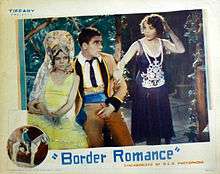Armida (actress)
Armida, born Armida Vendrell,[1] (29 May 1911 – 23 October 1989) was a Mexican actress, singer, dancer and vaudevillian born in Aguascalientes, Mexico.[note 1][2]
Armida Vendrell | |
|---|---|
Vendrell in 1949. | |
| Born | Armida Vendrell May 29, 1911 |
| Died | October 23, 1989 (aged 78) |
| Nationality | Spanish |
| Occupation | Actress, singer, dancer, vaudevillian |
| Years active | 1929-1951 |
| Height | 1.50cm 4ft 11 |
Early life
Armida came from a theatrical family; her father Joaquin Vendrell was a well known magician "The Great Arnold" who emigrated to Mexico from Barcelona, Spain.[3] She also had two sisters that were performers as well, Lydia Vendrell and Lola Vendrell. By the time she reached the age of nineteen she had a lucrative, long-term screen contract. She purchased a beautiful home where she lived with her family. She aspired to send her younger sisters to college.
Vendrell was just five feet tall with high heels and two inches less without them. Armida had a tiny face with two dark eyes of radiant beauty. She spoke quickly, without pausing. As a small child she spoke Spanish only.
Vaudeville in California
Armida started performing at a young age, when her family moved from Mexico to the United States, her father opened the first movie theater in Douglas, Arizona. She and her sisters would sing and dance during intermission and her father would perform an illusionist act.
Armida was discovered in the old Hidalgo theater in the Plaza in Los Angeles. The Plaza was the oldest section of the city. Armida was appearing in a small, home-manufactured vaudeville skit, along with her sister Delores. A talent scout for a coastal vaudeville circuit was in the audience and offered her a chance to perform four shows a day, known as a "four-a-day". Armida progressed from the drama marts of the Plaza to various Broadway productions after being discovered by Gus Edwards, stage and screen actor, songwriter, and dance instructor. She participated in as many as twenty-four vaudeville numbers a day while in New York. Edwards brought her back to Hollywood with him and began to feature her in colortone novelties. Gus once said of Armida, that she possessed "the emotional temperament of an actress capable of surmounting the most difficult of histrionic roles".
Film career

The young Mexican actress was a success and soon progressed into short subjects in the films and was under contract to United Artists. Her first film of note featured her in a role opposite actor John Barrymore. By the time she was eighteen, Warner Brothers offered her a five year-contract.[4] In On the Border (1930) Vendrell played Pepita, a Spanish girl. She is protected from the leader of a band of desperadoes by her lover and her pet dog, Rin-Tin-Tin. The story was an exciting one about Chinese people being smuggled over the Mexican border into the United States.
Armida appeared in films like Border Romance (1929), The Show of Shows (1929), General Crack (1930), Under a Texas Moon (1930), The Marines Are Coming (1934), Under the Pampas Moon (1935), Patio Serenade (1938), Machine Gun Mama (1944), Bad Men of the Border (1945), Congo Bill (1948) and The Gay Amigo (1949). Her final role was in Rhythm Inn (1951), in which she played a specialty dancer. She also appeared with Gene Autry in the western Rootin' Tootin' Rhythm (1937). One of her few leading roles was in The Girl from Monterrey. She also made a notable appearance on Broadway with Nina Rosa (1930–31).[4]
Filmography
- Rhythm Inn (1951) .....specialty dancer
- The Gay Amigo (1949) ..... Rosita
- Congo Bill (1948) ..... Zalea
- Jungle Goddess (1948) ..... Wanama
- Cuban Madness (1946) ..... Armida
- Bad Men of the Border (1945) ..... Dolores Mendoza
- South of the Rio Grande (1945) ..... Pepita
- Machine Gun Mama (1944) ..... Nita
- Here Comes Kelly (1943)
- Melody Parade (1943) ..... Armida
- The Girl from Monterrey (1943) ..... Lita Valdez
- Always in My Heart (1942) ..... Lolita
- Fiesta (1941) ..... Cuca
- South of Tahiti (1941) ..... Putara
- Out Where the Stars Begin (1941) (short film) .... Herself
- La Conga Nights (1940)
- Patio Serenade (1938)
- Rootin' Tootin' Rhythm (1937)
- Under the Pampas Moon (1935)
- The Marines Are Coming (1934)
- General Crack (1930)
- Under a Texas Moon (1930)
- On the Border (1930) as Pepita
- The Show of Shows (1929)
- Border Romance (1929)
Death
Armida Vendrell died in Victorville, California, on October 23, 1989, of a heart attack.
Notes
- A January 5, 1930, article in the Detroit Free Press says that she was born in Sonora, Mexico.
References
- Room, Adrian (2012). Dictionary of Pseudonyms: 13,000 Assumed Names and Their Origins, 5th ed. McFarland. p. 33. ISBN 9780786457632. Retrieved 9 March 2018.
- "Unknown Mexican Girl Wins Difficult Role". Detroit Free Press. Michigan, Detroit. January 5, 1930. p. Part Four - Page 1. Retrieved March 8, 2018 – via Newspapers.com.

- "Armida Still on Stage. Jan 31, 1933 news article". Library.illinois.edu. 1933-01-31. Retrieved 2013-07-24.
- "Armida Biography". IMDb. 2017.
Further reading
- Bedford, Pennsylvania Gazette, Theatre Activities, May 23, 1930, Page 10.
- Charleston, West Virginia Gazette, Cinderella Story, Sunday, September 22, 1929, Page 7.
- Los Angeles Times, Armida Is Gay, Young Discovery, October 21, 1928, Page B13.
- Los Angeles Times, Wave Of Popularity Sweeping Mexican Stars To Top Goes Marching On, January 27, 1929, Page C11
- Dye, David. Child and Youth Actors: Filmography of Their Entire Careers, 1914-1985. Jefferson, NC: McFarland & Co., 1988, p. 7.